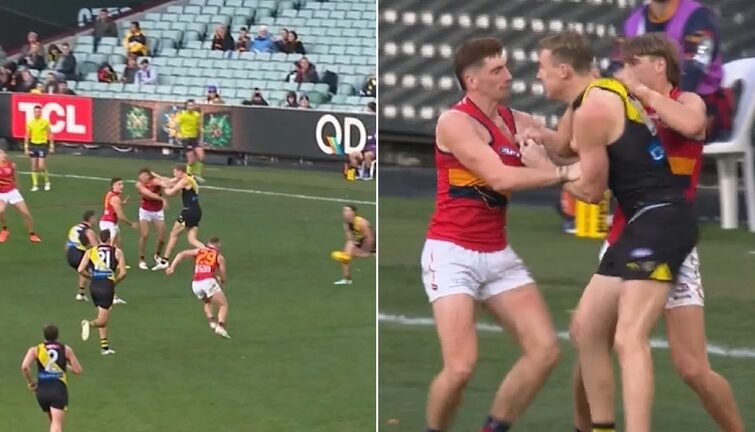Richmond forward Tom Lynch has received the biggest suspension of the season for his punch on Adelaide defender Jordon Butts.
Lynch was hit with a five-match suspension after fronting the Tribunal on Tuesday night.
His behind-the-play strike on Butts following a marking contest was graded as intentional conduct with high contact and severe impact – the latter due to the potential to cause injury despite the Crows defender playing out the game – by Match Review Officer Michael Christian.
The Tigers argued that the strike was only sufficient enough to constitute ‘high’ impact, which would reduce the sanction to three weeks.
The Tigers cited six reasons why the impact could not be given the maximum grading of ‘severe’ – that Butts was unhurt, that Lynch’s fist was not clenched, that Butts was hit only by the front part of the fist to lower the risk of injury, that the ball was in the vicinity of the incident, that the potential for injury was not greater than stunning the Crows defender, and that the hit was a ‘swipe’ rather than a punch.
In giving evidence, Lynch claimed he was trying to make contact not to Butts’ head, but to his ‘upper back’, though conceded he ‘got it wrong’.
However, the hearing took a strange turn when the 32-year old disputed the claim he hit Butts with a clenched fist, instead describing it as ‘swiping’, citing a fused joint on the middle finger of his right hand caused by an incident in 2020 as proof he ‘can’t fully form a fist’.
Tigers lawyer Sam Tovey argued that without sufficient proof of a ‘fully clenched fist’ from Lynch, which isn’t visible in footage of the incident, a severe grading could not be upheld.
The AFL, however, disputed that line of reasoning, citing several pictures that appear to show Lynch clenching his fist.
In response, Lynch argued that his finger was straight during the spoiling attempt.
AFL counsel Nick Pane proposed a five-match suspension, saying that it was a ‘blatant, forceful swinging arm’ from a ‘bygone era’ of Australian Rules football.
“The AFL position is quite simple, there’s no place for it in our game,” Pane said.
In unusual scenes, following a lengthy deliberation, the Tribunal upheld the ‘severe’ grading, but only decided on a sanction once hearing arguments from both the AFL and the Tigers, eventually suspending him for five matches.
In explaining the verdict, the Tribunal dismissed the Tigers’ argument that Butts being uninjured was grounds for the ‘severe’ grading to be lessened, and said Lynch’s strike was with at least a partially clenched fist even if his finger could not be bent.
“Lynch made a full and unrestrained swing of his arm in an upwards motion and the force of the impact with Butts’ head was considerable,” the Tribunal statement reads.
“Lynch made contact to Butts’ head with the heel of his palm, or at least a partially closed hand. Given the momentum of the swinging arm and the force with which the blow landed, it was quite capable of causing a concussion.
“It’s also relevant that Butts had no reason to anticipate or expect he may be about to be struck with force to the back of the head.
“The marking contest had completely finished and the ball had spilled free. Butts had no ability to protect himself or attempt to deflect the blow.
“We consider the totality of the matters, including the fact that Lynch clearly formed an intent to strike Butts, that it was not in play, that he struck Butts in the back of the head and that he did so having swung his arm with great force, we find that a significant sanction is warranted.
“We impose a sanction of a five-match suspension.”
As a result of the ban, Lynch will miss the Tigers’ games against Geelong, Essendon, West Coast, Collingwood and Gold Coast.







